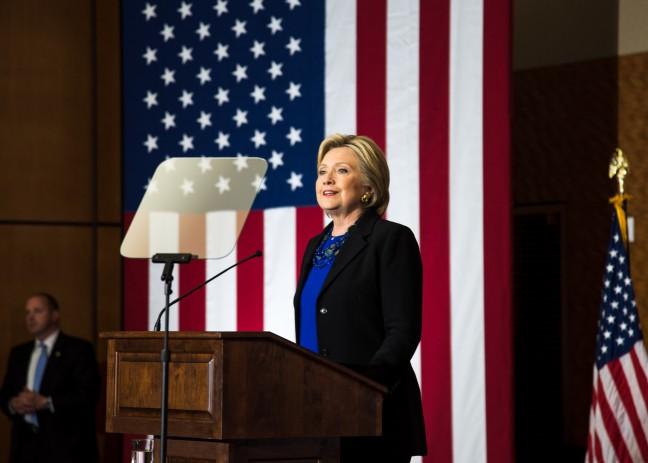Two days after rival Sen. Bernie Sanders, D-Vermont, drew a crowd of 8,000, former Secretary of State Hillary Clinton’s only scheduled appearance in Madison proved a sharp contrast to Sanders’ boisterous rally.
In front of 200-some invited guests, Clinton joined the chorus of Democrats seeking a hearing for President Barack Obama’s Supreme Court appointment, using familiar arguments and personal anecdotes.
Despite taking place in Gordon Commons, only select students received an invitation after an informal vetting process, University of Wisconsin College Democrats Chair Chet Agni, said.
The crowd consisted of students, faculty and current and former government officials, including former Wisconsin Democratic Gov. Jim Doyle.
Despite launching three new TV ads in Wisconsin, Clinton’s speech appeared more similar to that of a candidate in the general election than one seeking the Democratic nomination.
Instead of catering to Wisconsin issues, Clinton’s focus was on national issues, with barely a mention of her rival Sanders.
Clinton called on Senate Republicans to hold a hearing on the nomination of Judge Merrick Garland, and said both her time within the Senate and as a lawyer inform her position. She described the court as a force that could “demolish progressive accomplishments,” but also one that could “give a voice to those with the least power.”
“[Republicans] say the American people shouldn’t be denied a voice,” Clinton said. “Well, as one of the 65 million who voted to reelect Barack Obama, I’d say our voice is being ignored right now.”
Chelsea Clinton touts mother’s broad policy positions in Madison speech
While not all attendees were in complete support of Clinton, they said it was her campaign’s policy, not her message, that appealed to them the most.
Former alderman Scott Resnick said he endorsed Clinton because of her pragmatic policy goals.
Given Clinton’s weakness among college age liberals, students in attendance said they found it interesting that the event was closed to most of the student body. Agni said the Clinton campaign had asked him to ensure students he invited were Clinton supporters.
Given the interruptions that have become commonplace at rallies across the country, Agni said it made sense for Clinton’s campaign to be wary of who attended. But Agni said the decision to host the event directly above where students eat and deny them access was puzzling and upset many students.
“To be fair this is how most political events happen,” Agni Said. “When Russ Feingold came here it was also a closed event.”
Describing the far reaching effect of SCOTUS on policy, Clinton appealed directly to student concerns, citing laws allowing guns on campus, affirmative action and women’s access to abortion providers. Clinton underscored the gravity of the Supreme Court nomination by remarking on the advanced age of three other justices and their projected retirement.
Clinton tailored her arguments to her audience by describing the considerable impact of Citizens United on the political process, a Supreme Court case that originated in Wisconsin. SCOTUS ruled in Citizens United that corporations are guaranteed unbridled use of funds to affect elections.
“Wealth should not be privileged in the courts, in fact wealth should carry no privilege at all,” Clinton said.














